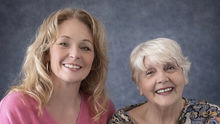Salvos, snipers and service
- Aug 15, 2025
- 3 min read
Updated: Aug 15, 2025

BY BARRY GITTINS
While VE Day (Victory in Europe) had occurred months prior (on 8 May 1945), the Second World War would continue to be waged until Japan surrendered to the US and the Allies on 15 August 1945 (VJ Day – Victory over Japan), 80 years ago today, post the atomic horrors of Hiroshima and Nagasaki.
The 1945 issues of The Salvation Army’s weekly wonder, the War Cry, continued to chronicle the adventures of Salvo chaplains and Red Shield Representatives around the world.
The reportage is a curious, heady mix of life-threatening actions, routine chores and the rich strain of human interaction under unbelievable pressures.
One Salvation Army corporal “dived right into a sticky position” when he drove straight past AIF tanks and infantry to serve coffee and biscuits in a firefight in Labuan. The incident, reported by war correspondent Allan Dawes and published by the War Cry, meant the unnamed Salvo was courageously serving troops as they took fire from snipers and “unfriendly forces firing from commanding high ground on both sides of the narrow road”, with the undergrowth and gullies “thick with booby traps”.
Ignoring increasing fire, negotiating precipices, swamp, jungle, with wounded men evacuated from tanks, and infantrymen momentarily pinned down, the Salvo swanned on, calmly dishing up refreshments while his hitchhikers (“correspondents” and a “cinema”) filmed “the whole incident”.
Thankfully, not every day was dramatic for The Salvation Army personnel supporting the troops. One Red Shield man gratefully reported a service barber refusing to accept payment for an overdue haircut.
From left: A Salvation Army Red Shield representative with Australian Women’s Army Service personnel; troops in the Ringwood Red Shield Hut; Captain C.B.W Bradford, better known as ‘Cappy’, serves soldiers in New Guinea in World War Two.
A Salvo major had finished visiting a naval station with his corporal and their mobile unit, chockablock with comforts, only to find the servicemen unusually keen to have a chat, check out the Red Shield vehicle and stretch out the visit. Urged to hang around, two sailors arrived with smiling faces and “revealed to the Red Shield men the reason for the delay” – a successful catch! “The major and corporal had fish for supper that night.”
Another Red Shield officer reported delivering much-needed soap being delivered in a military camp, with martial personnel smelling sweetly of “roses, carnations, lilies of the valley, musk, honeysuckle and other flowers”.
The Salvo followed up by supplying an electric iron to have the troops look their best on leave before having the camp’s wireless set repaired. Nothing was too much or too hard for the troops.
In Balikpapan, “with its battered beach, hammered with gunfire from the sea, deluged with bombs from the air”, the Salvos’ Cappy Radford dished out 11,000 cups of tea over six days, using 600 gallons of water. To the loud amusement of the Australian fighters, Cappy even managed to scrounge up a pack of chewing gum for the much-photographed Supreme Commander, US General Douglas MacArthur.
From left: A Red Shield Hut being built in Darwin in 1941; Major Albert Moore’s Red Shield coffee point on the Kokoda Track in WWII; Australian soldiers form up outside Red Shield House in Malaya in WWII.
Salvos were sometimes Johnny on the spot, or a good fill-in option for people in hard times. A “forlorn-looking soldier” asked a Red Shield rep if he was the padre. “No”, the Salvo replied, “that’s the padre’s tent.” “But you’re The Salvation Army man?” “Yes. “Well, you’ll do me,” the digger said. “The man told his story and received wise counsel,” the War Cry reported. “A few days later, he was discharged, but before leaving, he thanked the Salvationist for the excellent help he had given.”
The horrors and everyday acts of kindness and service changed the experiences of military personnel. Salvationists were part of that experience, and their deeds are still remembered to this day by veterans and their families.


















